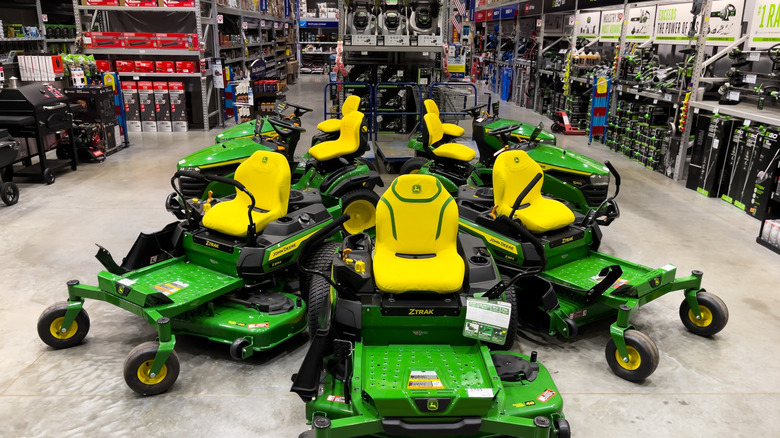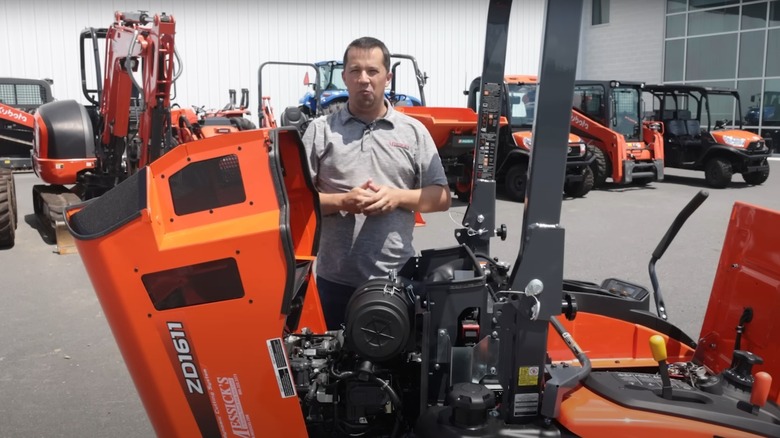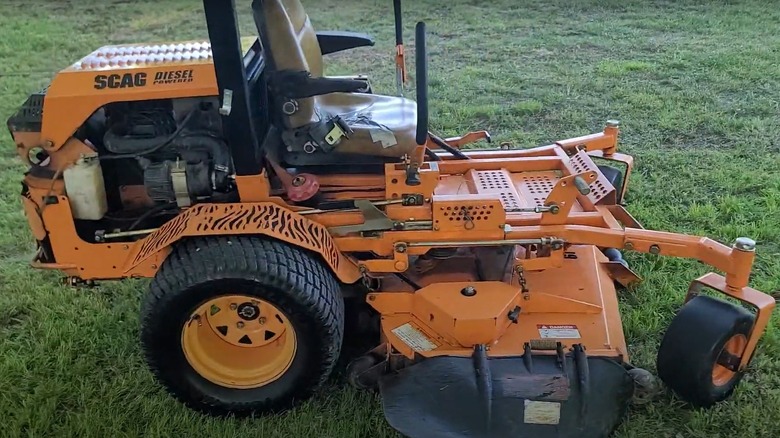Do Diesel Mowers Last Longer Than Gas-Powered Models? Here's What We Know
You might already know that road vehicle engines running from diesel will last longer than vehicles running from standard gasoline. Because diesel fuel comes directly from crude oil, it provides lubrication that helps the engine run more smoothly and minimizes wear in the engine components. Gasoline contains hundreds of different hydrocarbons and sulfur, leading to corrosion over time when inadvertently combined with water.
When you're trying to determine how long your lawn mower should last — and how you can expand its lifespan — you might wonder whether you should use a diesel lawn mower engine. Similar to those in road vehicles, a diesel engine in a lawn mower generates more durability and a longer life than a gas-powered model. Diesel engines on mowers tend to require less maintenance during their lifespans, create less noise during operation, use significantly less fuel, and generate more power.
If you're seeing signs that it's time for a new lawn mower, you might be ready to consider a diesel-powered design. However, the challenge may be in finding a model to purchase that's aimed at residential users. Most of these models are made for lawn care contractors who use large machines. Commercial-grade zero-turn mowers are commonly available with a diesel-powered engine, including from manufacturers like Scag, Kubota, Hustler, Toro, Husqvarna, and John Deere. These are highly regarded commercial mower brand names (you won't find diesel models from the worst lawn mower brands). Learn more about why diesel lawn mower engines have longer lifespans.
The science behind why diesel lawn mower engines last longer
Why do diesel lawn mowers last longer than gas-powered models? Diesel mower engines tend to run with greater efficiency than gas-powered options. This places less wear and tear on the engine. Many diesel mowers use three- or four-cylinder engines, which helps them generate more power but also run more smoothly with less vibration. When a lawn mower motor has less vibration, it extends the lifespan of the equipment. (Single-cylinder engines are common with walk-behind mowers that run from gasoline, and they tend to suffer from significant vibration issues.)
Lawn mower diesel engines might last between 4,000 and 5,000 operational hours, which is about twice (or more) as long as a standard gasoline zero-turn lawn mower, which typically offers 1,500 to 2,500 hours of operation. One of the reasons diesel mowers have a longer lifespan is they frequently use a liquid-cooled design, which uses a mixture of water and antifreeze to cool the engine and expel heat through a radiator. Compared to an air-cooled design, the liquid-cooled model may last twice as long.
Using a diesel engine in a lawn mower allows you to operate at fewer revolutions per minute (RPM) for the rotor shaft. This reduces wear and tear on all the components compared to an engine that is running at a higher RPM. Additionally, diesel engines are becoming more environmentally friendly. They now operate in a cleaner manner to match tightening emissions restrictions, and cleaner engines tend to last longer.
When a diesel mower might not last longer or be a good investment
Even though diesel engines last longer than gas-powered mower engines, maintenance remains important to give you the best chance at maximizing the lifespan of the diesel lawn mower. Generally, these lawn mower engines require less maintenance than gas models. Oil changes must occur twice as frequently for a gasoline engine, for example. However, that doesn't mean you should neglect your maintenance requirements.
As another aspect of extending the diesel lawn mower engine's lifespan, pay attention to the quality of diesel fuel and motor oil you're using. Follow the manufacturer's recommendations for oil and fuel types to ensure the longest lifespan. You might need to deploy special maintenance techniques if you're using biodiesel fuel, for example.
And not everyone will receive the full benefit of a diesel lawn mower engine's longevity. An average homeowner spends about 384 hours mowing in a lifetime (per Today's Homeowner). Considering an average zero-turn mower with a diesel engine can last 4,000 to 5,000 operational hours, the average homeowner isn't going to reach the mower's maximum life expectancy. Because a gas-powered zero-turn lawn mower has a lower upfront cost, the longevity in the diesel machine might not be worth the extra expense unless you have a huge lawn or run a commercial operation. It's not unusual for a commercial mowing company to use the machine for 1,000 hours per year, meaning the company is likely to reach the lifespan of the diesel engine within a few years.


